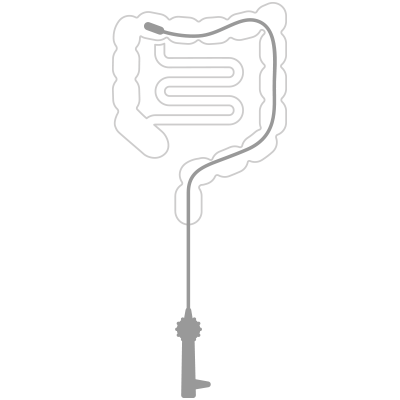Chronic inflammatory bowel disease (IBD)
A clinical focus of our practice is the diagnosis, treatment and long-term care of patients with chronic inflammatory diseases.
A clinical focus of our practice is the diagnosis, treatment and long-term care of patients with chronic inflammatory diseases. Chronic inflammatory diseases (IBD) are periodic (recurrent) or continuous inflammatory disorders of the gastrointestinal system. The two commonly known conditions are ulcerative colitis and Crohn's disease.
We have extensive experience in the treatment and care of IBD patients and look after a large IBD group in our practice. The diagnosis of a chronic inflammatory disease is often associated with uncertainty, anxiety and changes in one’s private and professional life. Such a situation requires time to understand and manage the disease and confidence in the attending physician. Our goal is therefore to develop an individualised medical treatment plan. In addition to medical therapy or surgery, comprehensive care is of great importance. Our practice also works very closely with the Swiss IBD Cohort Study (http://ibdcohort.ch) to discuss and advise on specific questions at an interdisciplinary level.


Symptoms
The symptoms are very diverse and often not limited to the gastrointestinal tract. Typical symptoms related to the intestine include bowel irregularities with diarrhoea, blood found in bowel movements, and abdominal cramps. Frequently, the complaints are associated with general symptoms such as fatigue, weakness and fever. In some patients, inflammatory complaints can also affect other parts of the body such as the skin, eyes and joints.

Diagnostics
Since the symptoms can be very subtle at the beginning of the disease, they are often initially ignored by the patient or interpreted as an “irritable” bowel. In a first step, a laboratory examination of blood and stool (calprotectin) samples are made. Depending on the outcome, the diagnosis is complemented with further imaging (ultrasound, computed tomography, magnetic resonance) or endoscopy tests (gastroscopy or colonoscopy).

Treatment
During IBD therapy, the treatment of an acute inflammatory attack is differentiated from the course of action taken during a symptom-free interval to prevent renewed inflammation (maintaining remission).
Long-term treatment
For the acute relief of IBD symptoms, various drugs are available and intended to inhibit and eliminate short-term inflammation as well as the pain and discomfort associated with this condition. These drugs contain cortisone, a hormone which is actually produced by the human body itself and is automatically released into the body during stress situations. Drugs containing this active substance can be taken at high doses during short-term periods, and usually reduce the intestinal inflammation effectively. However, due to the severe side effects of long-term cortisone use such as that in the treatment of diabetes, osteoporosis, hypertension or cataract, these preparations are unsuitable for continuous treatment.
Cortisone-free drugs such as aminosalicylates only work for mild inflammatory reactions. For some patients who suffer constant recurring inflammatory symptoms, alternative cortisone-free drugs have become available which have a different mechanism of action. They are known as so-called immunosuppressants that artificially reduce the activity of the body's defence system in the event of inflammation. Thereby, the inflammation is temporarily suppressed. IBD therapy also increasingly uses so-called biologics, which involve the use of antibodies to control inflammation. Currently, antibodies can also be produced in the laboratory and are very selective in their attack on a specific inflammatory substance of the patient such as tumour necrosis factors (TNF).
Rarely surgical intervention is needed in case of abscess or stricture. We are cooperating with highly specialised surgeons in the field of IBD. Our long term goal is to avoid inflammation and development of strictures or other complications.